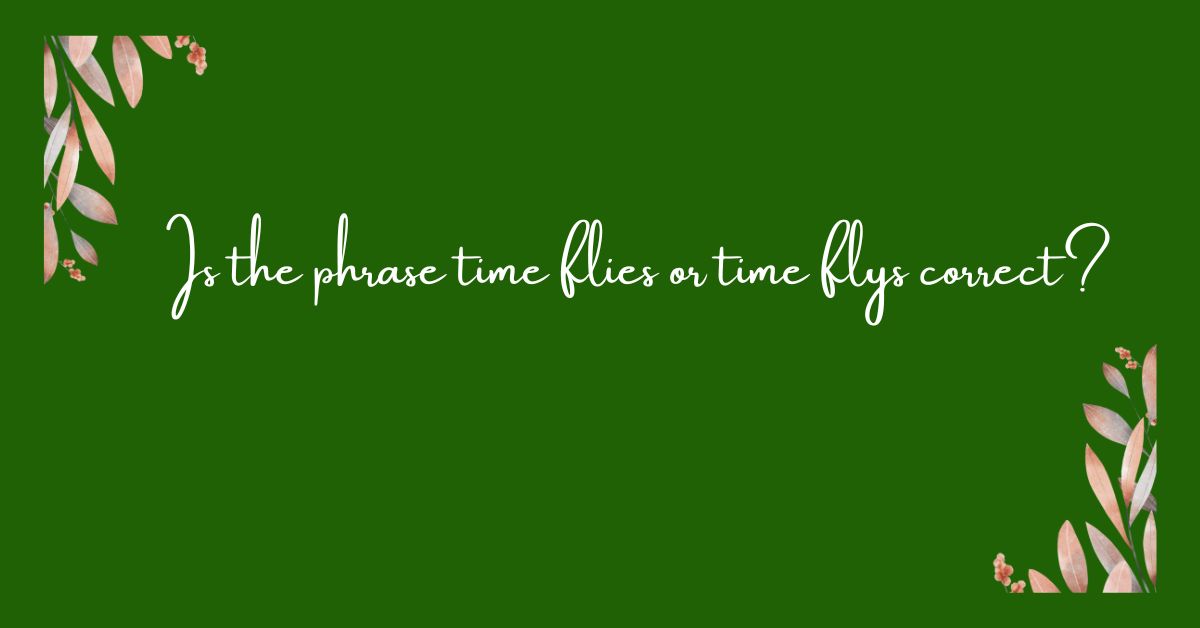Is the phrase “time flies” or “time flys” correct? This common question often trips people up, leading to confusion and mistakes. Understanding the right usage can help you communicate more clearly and confidently.
In this context, “time flies” is the correct phrase, where “flies” serves as the verb in the present tense. It captures the idea that time seems to move quickly, especially when we’re enjoying ourselves. On the other hand, “flys” is a misspelling that people sometimes mistakenly use.
In this article, we’ll dive into the grammatical rules that clarify why “time flies” is the correct choice. You’ll discover practical examples and tips to avoid common pitfalls. By the end, you’ll feel empowered to use this phrase accurately in your everyday conversations.
What’s the Meaning of the Word Fly?
The word “fly” has several meanings, but it primarily refers to the action of moving through the air. For example, birds and airplanes can fly. Additionally, “fly” can describe a type of insect, known for its ability to buzz around.
In a broader sense, it can also mean to pass quickly, as in the phrase “time flies,” suggesting that time seems to move swiftly when we are enjoying ourselves.
Which Is Correct: Time Flys or Time Flies?
The correct phrase is “time flies.” This uses “flies” as the present tense form of the verb “fly,” indicating that time moves quickly. On the other hand, “time flys” is a common misspelling and should be avoided.
Understanding this distinction is important for clear communication, especially in writing. Using the correct term not only enhances your credibility but also ensures that your message is understood as intended.
Make the Time Fly
To “make the time fly” means to engage in activities that make time feel like it’s passing quickly. This often happens during enjoyable experiences, like spending time with friends, pursuing hobbies, or getting lost in a good book.
When you’re fully absorbed in what you’re doing, you often lose track of time, making it seem to disappear. Finding ways to make your time fly can enhance your daily life and create memorable moments.
What Are the Synonyms of the Verb Flies?
The verb “flies” has several synonyms that convey similar meanings. Some common options include “glides,” “soars,” and “ascends.” Each of these words describes movement through the air but can carry slightly different connotations.
For instance, “soars” often implies a graceful, upward motion, while “glides” suggests a smooth, effortless flight. Using these synonyms can add variety to your writing and help you express ideas more vividly.
Flies or Flys – Now It’s All Clear! Examples in Sentences
Now that we understand the correct form, let’s look at how to use “flies” in sentences. For example, you might say, “Time flies when you’re having fun,” highlighting how quickly time can pass during enjoyable moments.
Another example could be, “As summer approaches, the days seem to fly by.” These sentences demonstrate the proper use of “flies” and illustrate its meaning in context, making it easier to remember.
A Handful of Useful Fly Idioms
There are several idioms that incorporate the word “fly,” each carrying its own unique meaning. For instance, “time flies” reminds us how quickly time can pass. Another idiom, “fly by night,” refers to someone or something that is unreliable or temporary.
Additionally, “fly off the handle” means to lose one’s temper suddenly. Using these idioms can enrich your conversations and help you express ideas more creatively.
How Time Flies or Flys – Now It’s All Clear! Examples from Literature in Sentences
Understanding the phrase “time flies” is essential, and literature provides great examples that illustrate its usage. For instance, in Shakespeare’s works, characters often reflect on the swift passage of time, emphasizing how quickly life changes. You might find a line like, “As the seasons change, so too does our time, flying by in the blink of an eye.”
Another example comes from modern literature, where authors describe the fleeting moments of joy, such as, “In the laughter of children, time flies unnoticed, leaving behind only memories.” These literary examples highlight the beauty and truth of the phrase, showing how it captures the essence of our experiences.
FAQ
Q: Why do people confuse “flies” and “flys”?
A: Many people mistakenly use “flys” due to its phonetic similarity to the correct form. It’s essential to remember that “flies” is the proper spelling when referring to the verb in this context.
Q: Can “time flies” be used in different tenses?
A: Yes, you can use variations of the phrase in different tenses. For example, “time flew” refers to the past, and “time will fly” indicates future events.
Q: Are there other phrases similar to “time flies”?
A: Yes, phrases like “time slips away” and “time zooms by” convey similar meanings about the swift passage of time.
Q: How can I make my time fly?
A: Engaging in enjoyable activities, setting goals, and staying busy can help make your time feel like it’s flying by.
Conclusion
In summary, understanding the correct phrase “time flies” enriches your language and communication skills. By exploring its meaning, synonyms, and literary examples, you gain a deeper appreciation for how we express the swift passage of time. Remember, using the correct form not only enhances your writing but also makes your conversations more engaging. Embrace the beauty of language, and let your words reflect the fleeting moments of life!
Must Read:
- Roll Call Or Role Call: What’s The Difference?
- Adjectives Start with J: Words That Start with the Letter J
- What Does WYLL Mean? Decoding the Viral Slang Term
- WTV Meaning on Snapchat Decode This Popular Slang Term

